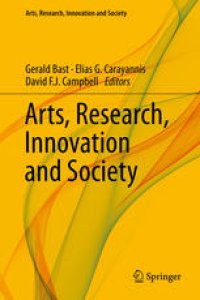
Ebook: Arts, Research, Innovation and Society
- Tags: Innovation/Technology Management, Political Economy, Arts
- Series: Arts Research Innovation and Society
- Year: 2015
- Publisher: Springer International Publishing
- Edition: 1
- Language: English
- pdf
This book explores – at the macro, meso and micro levels and in terms of qualitative as well as quantitative studies – theories, policies and practices about the contributions of artistic research and innovations towards defining new forms of knowledge, knowledge production, as well as knowledge diffusion, absorption and use. Artistic research, artistic innovations and arts-based innovations have been major transformers, as well as disruptors, of the ways in which societies, economies, and political systems perform. Ramifications here refer to the epistemic socio-economic, socio-political and socio-technical base and aesthetic considerations on the one hand, as well as to strategies, policies, and practices on the other, including sustainable enterprise excellence, considerations in the context of knowledge economies, societies and democracies.
Creativity in general, and the arts in particular, are increasingly recognized as drivers of cultural, economic, political, social, and scientific innovation and development. This book examines how one could derive and develop insights in these areas from the four vantage points of Arts, Research, Innovation and Society. Among the principal questions that are examined include:
- Could and should artists be researchers?
- How are the systems of the Arts and Sciences connected and/or disconnected?
- What is the impact of the arts in societal development?
- How are the Arts interrelated with the mechanisms of generating social, scientific and economic innovation?
As the inaugural book in the Arts, Research, Innovation and Society series, this book uses a thematically wide spectrum that serves as a general frame of reference for the entire series of books to come.
This book explores – at the macro, meso and micro levels and in terms of qualitative as well as quantitative studies – theories, policies and practices about the contributions of artistic research and innovations towards defining new forms of knowledge, knowledge production, as well as knowledge diffusion, absorption and use. Artistic research, artistic innovations and arts-based innovations have been major transformers, as well as disruptors, of the ways in which societies, economies, and political systems perform. Ramifications here refer to the epistemic socio-economic, socio-political and socio-technical base and aesthetic considerations on the one hand, as well as to strategies, policies, and practices on the other, including sustainable enterprise excellence, considerations in the context of knowledge economies, societies and democracies.
Creativity in general, and the arts in particular, are increasingly recognized as drivers of cultural, economic, political, social, and scientific innovation and development. This book examines how one could derive and develop insights in these areas from the four vantage points of Arts, Research, Innovation and Society. Among the principal questions that are examined include:
- Could and should artists be researchers?
- How are the systems of the Arts and Sciences connected and/or disconnected?
- What is the impact of the arts in societal development?
- How are the Arts interrelated with the mechanisms of generating social, scientific and economic innovation?
As the inaugural book in the Arts, Research, Innovation and Society series, this book uses a thematically wide spectrum that serves as a general frame of reference for the entire series of books to come.